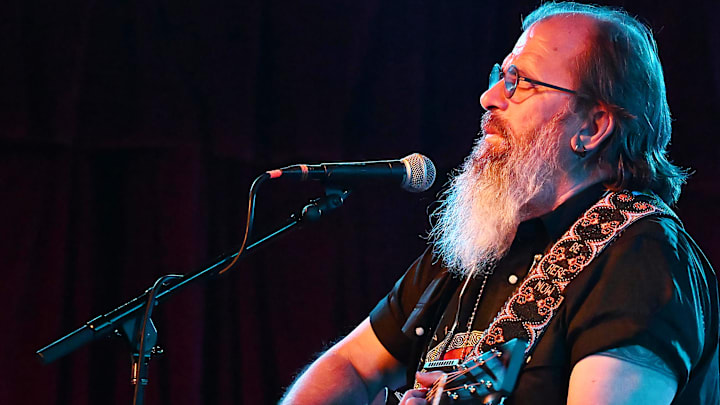Steve Earle opened his show at a sold-out Birchmere on Tuesday night with “Tom Ames’ Prayer,” a song about a young bank robber who has a complex relationship with the Lord. “I wrote that song fifty years ago, when I was 20,” Earle said. “You do the math.”
Earle is celebrating fifty years as a chronicler of the American experience on his current tour. He has always been a great storyteller and talker, but I have never heard him as open about his life in music as he was on Tuesday night, offering fascinating back stories on the creation of many of his albums, with a representative song or two from each.
And since his albums reveal a good chunk of his life, Earle’s stories were about his life as well – the dark times and the fortuitous breaks. The story begins when a 19-year-old leaves Texas for Nashville, seeking fame and fortune.
Steve Earle has been singing the American story for fifty years, and he has the songs to prove it
The Civil War story “Ben McCulloch” followed “Tom Ames’ Prayer” on Tuesday. Those were two of the first songs he wrote when he arrived in Nashville, but they wouldn’t appear on an album for twenty more years. The truth is, despite impressing a lot of people and getting a publishing deal rather quickly, Earle was having a lot of trouble getting an actual album out.
Maybe it was his natural orneriness, or maybe it was the burgeoning drug problem that would almost take his life. Whatever the reason, he struggled for ten years, missing out on the outlaw movement that was taking root in the 1970s. By the time he released his first album it was 1986, Earle joined Dwight Yoakam and Randy Travis as the harbingers of neo-country.
He said the lightbulb went off for him when he saw Bruce Springsteen performing “Born in the U.S.A. Earle suddenly knew what kind of songs he wanted to write. “Guitar Town,” from his debut album of the same name, made that point very clearly on Tuesday.
After playing a lovely bit of high school nostalgia – “No. 29” – from his underrated second album Exit 0, Springsteen makes another appearance. When news got out about the Boss buying Earle’s third album, Copperhead Road, sales took off. I usually see Steve Earle pick up a mandolin when he plays “Copperhead Road,” but this time he kept his guitar. Doesn’t matter. The song remains a knockout.
So that’s how it went on Tuesday. The singer-songwriter tells stories about his albums and then sings a track or two from each, chronicling his entire career. There was the double-shot recalling his drugged-out years – “South Nashville Blues” and “CCKMP.”
He always plays them together because as much as he likes the former, he feels it might glamorize those addiction days a but too much. The second song, with a title that stands for “cocaine cannot kill my pain,” provides a harrowing rejoinder.
It's always a joy to hear Earle sing one of the songs that came out of his move from Tennessee to New York twenty years ago – “City of Immigrants.” It gains more and more resonance with each passing day. So does “It’s About Blood,” about a West Virginia mining disaster that claimed 29 lives in 2010.
Whether intentional or not, it made for a powerful companion to the nostalgic “No. 29” that came early in the evening.
Earle’s support for this tour, Zandi Holup, joined him onstage for his first encore, “I’m Not Missing Anything But You.” They have been writing songs together for a few years now, and judging by her opening set, Holup has a big career ahead of her when her debut album Wildflower drops later this year.
With singles like “Gas Station Flowers” and “Go Find Less” already making the rounds, Earle’s prediction that “the next time you see her, it’ll be a lot more expensive” seems prophetic.
Steve Earle is a realist. He confronts difficult American subjects like gun control, union-busting, and the dangers of addiction head-on. But as he said toward the end of the evening, he is also an eternal optimist, taking the long view on American history, recognizing the cyclical nature of culture and politics, and never giving up on the basic good nature of humanity.
You can’t close a show with the impossibly optimistic “Galway Girl” and walk away depressed. He brought out the mandolin for that one.
